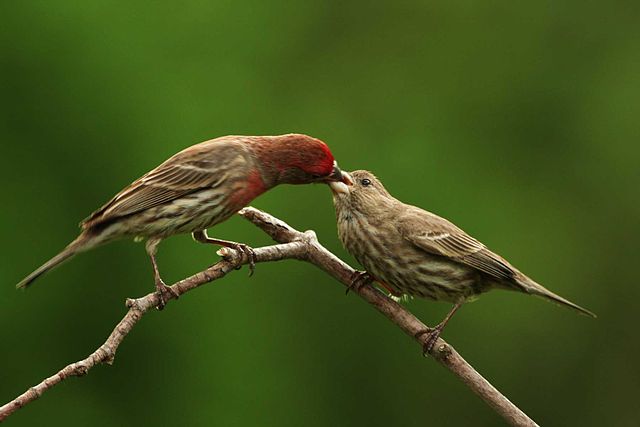House finch has to accept harmful side effects
Smoked-trough cigarette filters are noxious, still some bird species add them to their nest lining, where the nicotine will repel blood-sucking parasites. They do so only when they need to, as Monserrat Suárez-Rodríguez and Constantino Macías Garcia show.
Spent cigarette filters are popular among some bird species, for instance the house finch. The birds weave cellulose fibres from discarded butts into the lining of their nests, together with more conventional soft materials such as feathers, fur or cotton. Monserrat Suárez-Rodríguez en Constantino Macías Garcia wondered whether the birds collect cellulose from butts accidently, or whether they do it to protect their young against blood-sucking parasites: lice and ticks. From earlier research, they knew that ectoparasites are repelled by nicotine, and the more smoked-through cigarette butts could be found in a nest, the smaller the amount of parasites was. Weight gain and fledging success of young increased with the proportion of cellulose from butts in the nest lining.
But they also knew that the butts are harmful to adult birds and their offspring. Next to nicotine, the butts contain more than 400 different substances such as heavy metals and insecticides, many of which are toxic. The substances may enter the birds’ bodies through the skin or the lungs.
Damage
The research team had analysed blood samples of parents and young and found nuclear abnormalities in many red blood cells (in contrast to human red blood cells, those of birds contain a nucleus with dna). The larger the proportion of butts in the nest lining, the more genotoxic damage was seen. Red blood cells live for only two to four weeks, so the damage may have no serious consequences. But other cells types likely are damaged too. The question is whether the benefits of adding cigarette butts to the nest lining – less parasites, resulting in better growth – are large enough to outweigh these costs.
The answer will depend on how much the butts are needed to fight off parasites.
Ticks
Now, experiments reveal that house finches act accordingly: they bring more smoked-through cellulose fibres from cigarette butts to their nests if parasites are present than if they’re not. The researchers removed the nest lining from a number of nests shortly after the young hatched, and added a piece of felt instead; by doing so, they removed the bulk of the tick population from the nest as well. They measured the amount of butts in the original lining. They added living ticks to some of the artificial felt nest linings, dead ticks to other linings and nothing to the remaining linings. After the young fledged, they collected the artificial linings to investigate how much butts the parents had added.
It appeared that the birds collected more butts if the researchers had added living ticks to their nest, so when it was useful to bring butts. Also birds that had brought a large amount of butts into their original nest lining, collected many butts now as well; apparently, they had experienced a high parasitic load during incubation.
The birds don’t collect cigarette butts randomly, the conclusion is, but in response to the presence of ectoparasites; so, it is a form of self-medication.
Willy van Strien
Photo: house finch male feeding young. Susan Rachlin (Wikimedia Commons, Creative Commons CC BY 2.0)
Sources:
Suárez-Rodríguez, M. & C. Macías Garcia, 2017. An experimental demonstration that house finches add cigarette butts in response to ectoparasites. Journal of Avian Biology, online September 1. Doi: 10.1111/jav.01324
Suárez-Rodríguez, M., R.D. Montero-Montoya & C. Macías Garcia, 2017. Anthropogenic nest materials may increase breeding costs for urban birds. Frontiers in Ecology and Evolution 5: 4. Doi: 10.3389/fevo.2017.00004
Suárez-Rodríguez, M. & C. Macías Garcia, 2014. There is no such a thing as a free cigarette; lining nests with discarded butts brings short-term benefits, but causes toxic damage. Journal of Evolutionary Biology 27: 2719–2726. Doi: 10.1111/jeb.12531
Suárez-Rodríguez, M., I. López-Rull & C. Macías Garcia, 2013. Incorporation of cigarette butts into nests reduces nest ectoparasite load in urban birds: new ingredients for an old recipe? Biology Letters 9: 20120931. Doi: 10.1098/rsbl.2012.0931
